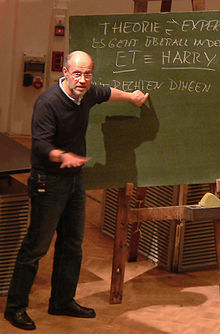

This biography of a living person needs additional citations for verification. Please help by adding reliable sources. Contentious material about living persons that is unsourced or poorly sourced must be removed immediately from the article and its talk page, especially if potentially libelous.
Find sources: "Harald Lesch" – news · newspapers · books · scholar · JSTOR (November 2021) (Learn how and when to remove this message) |
You can help expand this article with text translated from the corresponding article in German. (March 2023) Click [show] for important translation instructions. Content in this edit is translated from the existing German Wikipedia article at [[:de:Harald Lesch]]; see its history for attribution.{{Translated|de|Harald Lesch}} to the talk page. |
Harald Lesch
| |
|---|---|

Lesch at the Deutscher Fernsehpreis in 2021
| |
| Born | (1960-07-28) 28 July 1960 (age 63)
Gießen, West Germany
|
| Known for | Terra X |
| Scientific career | |
| Fields | Physics |
| Institutions | Ludwig Maximilian University of Munich |
Harald Lesch (born 28 July 1960) is a German physicist, astronomer, natural philosopher, author, television presenter, professor of physics at the Ludwig Maximilian University of Munich (LMU) and professor of natural philosophy at the Munich University of Philosophy.
Lesch was born in Gießen, Hesse. After completing secondary school in 1978 at the Theo-Koch-Schule in Grünberg, Hesse, Lesch studied physics at the University of Giessen, then at the University of Bonn, where he completed his doctoral degree in 1987 and worked at the Max-Planck-Institute for Radio Astronomy. From 1988 to 1991 he was a research assistant at the state observatory at Heidelberg-Königstuhl. In 1992 he was a visiting professor at the University of Toronto. In 1994 he was habilitated at the University of Bonn.

Since 1995, Lesch has been a professor of theoretical astrophysics at the Institute for Astronomy and Astrophysics at the LMU Munich.[1] Additionally, he teaches natural philosophy at the University for Philosophy in Munich. His main areas of research are cosmic plasma physics, black holes, and neutron stars. He is the expert on astrophysics in the Deutsche Forschungsgemeinschaft (DFG) (German Research Society) and a member of the Astronomische Gesellschaft (Astronomical Society). He is also a textbook author.
Lesch has made television appearances for the longstanding, self-presented production of the channel BR-alpha: alpha-Centauri, Lesch & Co., Denker des Abendlandes (Thinkers of the Western World), and Alpha bis Omega (From Alpha to Omega). He also presented shorter television series. His presentations attempt to make complex physical or philosophical issues more accessible to the public. In 2005 he was awarded the Communicator Prize by the DFG and the Stifterverband für die Deutsche Wissenschaft (Foundation for German Scholarship) for his television appearances and publications. To honor his work on making scientific findings understandable to the broad public, the Naturforschende Gesellschaft zu Emden (nature research society) awarded him an honorary membership on 15 March 2011.
For many years, Lesch has presented a number of television series for the channel BR-alpha, beginning with alpha-Centauri, in which he is to be seen since 1998. In "Lesch & Co." and "Denker des Abendlandes" (thinkers of the occident), he converses with the philosophy professor Wilhelm Vossenkuhl about philosophical topics. Alpha bis Omega deals with contradiction and consistency of religion and natural science, through conversations between Lesch and the Catholic theologist Thomas Schwartz.
In celebration of the Year of Einstein 2005, BR-alpha aired the 8-part series The Physics of Albert Einstein, where in each episode, one single scientific finding of Einstein was introduced by Lesch, who explained its significance. Starting in August 2007, the 16-part program The 4 Elements was aired weekly, which deals with the structure of the world, and in addition to scientific aspects, also handles cultural-historical aspects.
For the Pay-TV channel Syfy he differentiates scientifically based and fictional components of Star Trek in the series Star Trek – Science vs. Fiction. From April to the end of 2007, Lesch moderated the weekly 5-minute program sci_xpert for this channel, which dealt with viewer questions, which mostly had to do with feasibility of science fiction concepts (such as "How realistic are the huge spaceships from Independence Day?"), but which also addressed purely scientific topics (for example "What is gravity?"), which were handled in the tradition of alpha-Centauri. There were a total of 35 episodes.
Since September 2008, Lesch has been presenting the ZDF scholarly magazine Abenteuer Forschung (Adventures in Research). His predecessor was Joachim Bublath, who presented the show for many years.
At the start of the "International Year of Astronomy 2009", Lesch moderated in ZDF the 2½ hour special "How Light Was Born: the Long Night with Harald Lesch", in which he, between short documentary films, led conversations with the cabaret artist and hobby-philosopher Christoph Süß, the physics professor Günther Hasinger, and the theology professor Thomas Schwartz.
Since 2010, Lesch presents the show "Lesch's Kosmos", a 15-minute programme on the German documentary channel ZDFneo that deals with issues from various scientific fields.[2]

![]() Media related to Harald Lesch at Wikimedia Commons
Media related to Harald Lesch at Wikimedia Commons
| International |
|
|---|---|
| National |
|
| Academics |
|
| Artists |
|
| Other |
|